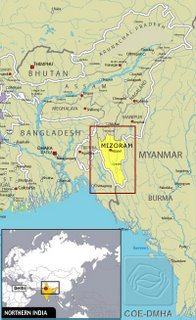
If you look at a map of India, or better still, one of the Indian sub-continental region, you will see Mizoram in the far eastern corner of India. It appears to be a land mass carved into the space between Bangladesh and Myanmar, like a plunging neckline. In the north, Tripura, Assam and Manipur border it, turning it into a landlocked island, making it dependant on the larger states for its surface transport routes. It's convenient for the rest of India to forget Mizoram. Before I left, many well-meaning folks warned me to be “careful”. No one could give me a valid reason for their warning other than to vaguely remark on it being a “disturbed” area, “terrorist problems” and so on. I think I can call any part of India by these terms today.
The Mizos are a friendly and peaceful lot. An example of this is an old tradition of theirs called “nualrim” (I think that's the word, but I could be wrong!), where a suitor may call on a girl of his choice and whether she likes him or not, she and her family must be polite and friendly and cannot turn him away. This is not the formal bride-seeing type of thing that happens in mainland India. In Mizo tradition, the suitor can casually drop in anytime, and can be a bit of a kabab mein haddi even when the girl has got herself a boyfriend, but must stop once she is married. Now that's civilised. Unfortunately I got to know of this custom on the day I was leaving, otherwise I may have taken my chances! Mizo women are beautiful, and in my opinion they lead over the other communities of the north eastern hill states with the possible exception of Sikkim. But it's a moot point.
I came away with a few other impressions. Young people here are at a loose end. Other than sports and games, and Church related activities, opportunities for recreation are non-existent. There are no movie halls, so cable/dish TV is creating one more generation of couch potatos. There are no discos or dance halls, and these guys don't just love music, they make good music too! This authoritarian regime of the Church and the YMA must necessarily lead to other avenues for release. So drugs easily infiltrate the porous border with Myanmar and Bangladesh. When I say drugs, I mean heroin and its ilk; and of course booze, both “lokkul” and the brands. The Army, which rations supply for their troops, is indirectly the biggest provider of black market liquor in Aizawl. I think somewhere there's a very deep, intentional, and insidious power-play at work which is being encouraged by the powers that be.
The tourism infrastructure exists in the guise of some ill-maintained establishments, rare events, inadequate promotion and publicity, and a whole lot of good intentions. On the other hand I'm not too sure its such a bad thing. I'd hate to see plane loads of ill-mannered, noisy, unreasonably demanding, uncompromising, insensitive, money-powered, cheap Bengali, flatulent Gujarati, and $1-a-day, Lonely Planet/Rough Guide American tourists littering the streets of Aizawl, creating chaos and confusion among these gentle people. Yet at the same time, economical, eco-friendly, sustainable, alternative tourism options which do not overload and unduly tax the environment and infrastructure exist. I strongly believe such options should be implemented as a collaborative effort of the government with NGOs and right-minded individuals already working in this area. Some things like Prohibition and the moralistic stranglehold of the Church will have to be removed to ensure success. The presence of the military too must be reduced from Level Paranoia to Level Just Another Cantonment.
It was a good trip for me. And it holds the promise of another one, perhaps more. There's much that is left to see and imbibe. This furthest corner of India is not merely a land of abundant biodiversity as the official calendar puts it. It is not just the land which the Tropic of Cancer cuts in half; nor is it only the bureaucratically named “land of myriad hues”. It is a land where hope lies in its natural defense against 'globalisation', where the earth still rules the lives of its people, where the technique is what to do, rather than how to do it, where the attitude of the people is the prime reason for its sustainability.
No comments:
Post a Comment